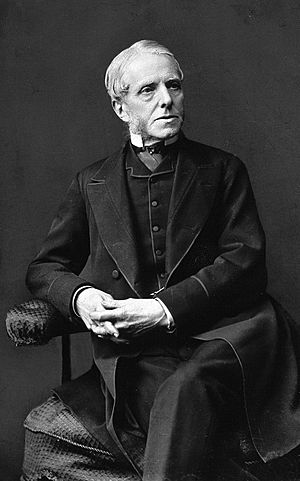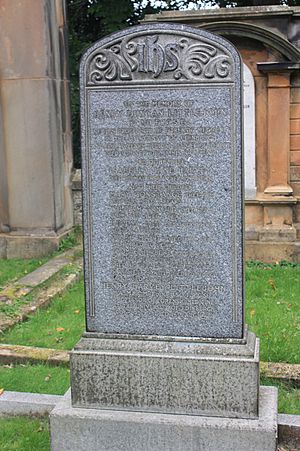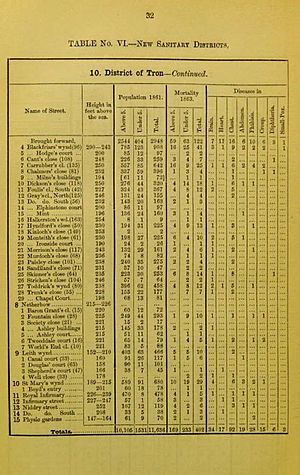Henry Littlejohn facts for kids
Quick facts for kids
Sir Henry Littlejohn
|
|
|---|---|
 |
|
| Born | 8 May 1826 Edinburgh, Scotland
|
| Died | 30 September 1914 (aged 88) Arrochar, Dunbartonshire, Scotland
|
| Education | University of Edinburgh, Royal College of Surgeons of Edinburgh |
| Years active | 46 |
| Known for | Advances in public health |
| Relatives | Henry Harvey Littlejohn (son) |
| Medical career | |
| Profession | Doctor |
| Field | Public health, forensic science |
| Notable works | Report on the sanitary condition of the City of Edinburgh (1865) |
Sir Henry Duncan Littlejohn (born May 8, 1826 – died September 30, 1914) was a Scottish doctor. He was a surgeon, a forensic scientist, and a public health leader. For 46 years, he was Edinburgh's first Medical Officer of Health. In this role, he greatly improved how people lived and their health in the city. He also worked as a police doctor and helped solve crimes in Scotland.
Contents
Early Life and Education
Henry Littlejohn was born in Edinburgh, Scotland, on May 8, 1826. He went to school at Perth Academy and then the Royal High School, Edinburgh. He studied medicine at the University of Edinburgh and became a doctor in 1847.
A Career in Medicine
After finishing his studies, Littlejohn worked at the Royal Infirmary of Edinburgh. He also spent some time studying in Paris. Later, he became a teacher of medical jurisprudence (which is about medical law and how it applies to legal cases) at a medical school in Edinburgh.
Improving Public Health
In 1862, Henry Littlejohn became Edinburgh's first Medical Officer of Health. At this time, many people in the city lived in very poor conditions. Their homes were often dirty, crowded, and lacked clean water or proper toilets. Diseases like cholera, typhoid, and smallpox were common and spread easily.
For three years, Littlejohn carefully studied how people lived and their health. In 1865, he published a detailed report. It showed how bad living conditions led to sickness and death.
Because of Littlejohn's report, the city leaders started a big plan to improve Edinburgh. They tore down the worst slum areas. This helped create the beautiful Old Town you can see today. Littlejohn also suggested new rules for water, sewage, building homes, food safety, and getting rid of waste.
Littlejohn wanted to track diseases to stop them from spreading. He pushed for a law that would make doctors report all cases of serious infectious diseases to him. Even though some doctors didn't like it, this law passed in 1879. It was the first law of its kind in Britain. This important rule was later used across all of Scotland.
In 1900, Littlejohn noticed a connection between smoking cigarettes and cancer. This was many years before it was widely accepted.
During his 46 years as Medical Officer of Health, the death rate in Edinburgh dropped a lot. Outbreaks of diseases like smallpox became much less common. His work to make reporting infectious diseases compulsory was a huge step forward in public health.
Police Doctor and Crime Solver
Henry Littlejohn also had an exciting career helping to solve crimes. In 1854, he became a part-time police doctor. He advised the police and legal system in Scottish criminal cases for over 50 years. He often gave expert evidence in trials.
One of his most famous cases involved a man named Eugene Chantrelle. In 1878, Chantrelle's wife became very sick and died. At first, police thought she died from gas poisoning because a broken gas pipe was found. But Littlejohn wasn't convinced. He examined some vomit and found traces of opium. This evidence helped lead to Chantrelle's arrest and conviction for murder.
Awards and Recognition

Littlejohn was elected president of the Royal College of Surgeons of Edinburgh in 1875. He also led the Royal Institute of Public Health. In 1895, Queen Victoria made him a knight, giving him the title "Sir."
Later Life and Family
In his later years, Sir Henry Littlejohn lived in Edinburgh. He retired from his public jobs in 1908 when he was 82 years old.
His son, Henry Harvey Littlejohn, followed in his father's footsteps. He also became a forensic scientist and a medical officer.
Sir Henry Littlejohn died on September 30, 1914, at his country home. He believed in cremation, so his body was cremated. His ashes were buried in the Dean Cemetery in Edinburgh, where he rests with his wife, son, and daughter.



